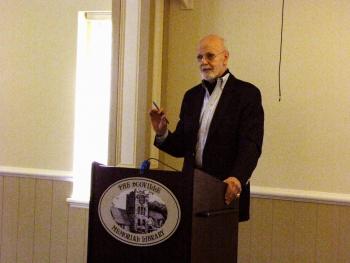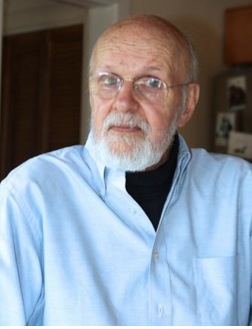
Charles Church observed the trial of
suspected terrorist Abd al Rahim al Nashiri,
and shared his observations May 10 in Salisbury. (Photo by Patrick L. Sullivan)
Thu, 05/22/2014 – 9:22am
By Patrick L. Sullivan
SALISBURY — Attorney Charles Church described the pre-trial maneuverings in the case of Abd al Rahim al Nashiri, a suspected terrorist who has been held by the United States since 2002, to an audience at the Scoville Memorial Library Saturday, May 10.
Church, author of the e-book “My Week at Guantanamo’s War Court” and a Lakeville Journal columnist, spent a week as an observer at Guantanamo in April 2013.
He said he had the choice of observing the al Nashiri case or the “more colorful” case against the men accused of planning the Sept. 11, 2001, attacks.
While the latter featured theatrical aspects such as a female member of the defense team dressing in traditional Arab clothing, he said he was glad to get the al Nashiri case in part because “the lawyers are fascinating.”
Church emphasized several times that the cases are being tried by military courts, not bound by the rules of civilian courts.
He quoted the lead defense attorney, Richard Kammen, as telling the judge, James Pohl, “We are making this up as we go.”
Al Nashiri is suspected of being in charge of the 2000 attacks on ships, including the USS Cole bombing. Church said after his capture in 2002, Nashiri was held in secret CIA facilities and tortured.
Nashiri was brought to Guantanamo in 2006 and has been there ever since.
“Torture is one of the elephants in the room in the case,” he said.
Some of the methods used to torture Nashiri are known, he continued. While naked and hooded, a power drill was operated near his head, and a pistol slide ratcheted.
The judge has ordered the government to provide full details of the interrogations. To date, the CIA has provided summaries.
Church said Kammen “went ballistic” in a secret session the defendant was not allowed to attend, arguing that the CIA has a history of misleading the court and that the summaries are false.
(He added that Kammen wears a kangaroo pin in his lapel, leaving no doubt as to his opinion on how the pre-trial process is proceeding.)
Kammen said the government is trying to hide the truth of Nashiri’s interrogation. Church quoted Kammen: “This desire for secrecy is the reason we are here, as opposed to a real court.”
Church said he found Pohl “estimable” as a jurist, but noted that the judge, an Army colonel, is employed under a one-year, renewable contract, and wondered if that might cloud his judgment.
Church described other aspects of the pre-trial process that would be very problematic in a civilian court, such as the discovery of listening devices hidden in the smoke detectors in the room the defense team used, or that the government had access to defense emails from a Department of Defense server both teams were using.
The rules are far different in the military courts. For instance, hearsay evidence is allowed at the judges’ discretion.
“How do you cross-examine hearsay?”
And the fact that Nashiri faces the death penalty was always on Church’s mind. “It is particularly sobering to watch a capital case. Films and television don’t evoke the same emotions.
“You’re looking at the guy they are trying to kill.”
Church said “my own lament” is that federal courts have tried about 100 terrorism cases, with a conviction rate in the high 90 percent bracket.
“So you can’t say that granting the accused more rights has gotten in the way of results.”
But, he added, Congress has banned the transfer of Guantanamo prisoners to the mainland.
“So we’re staggering along with these courts, where weird things always happen.”
TriCornerNews – The Lakeville Journal Co., LLC ©2014. All Rights Reserved.
_______________________________________
Source URL: http://tricornernews.com/node/35474
Links:
[1] http://tricornernews.com/category/articlead-category/lakeville-journal/salisbury
_______________________________________
Published on TriCornerNews – News, Classifieds, and more from The Lakeville Journal, The Millerton News, The Winsted Journal and Compass A&E (http://tricornernews.com)

